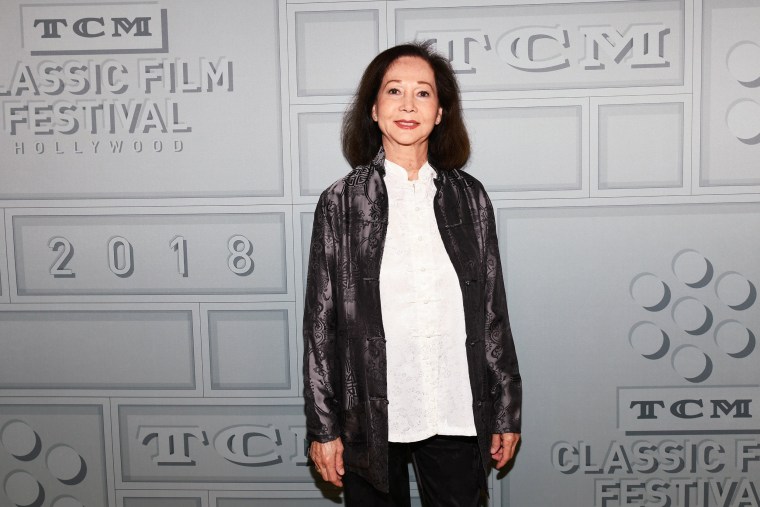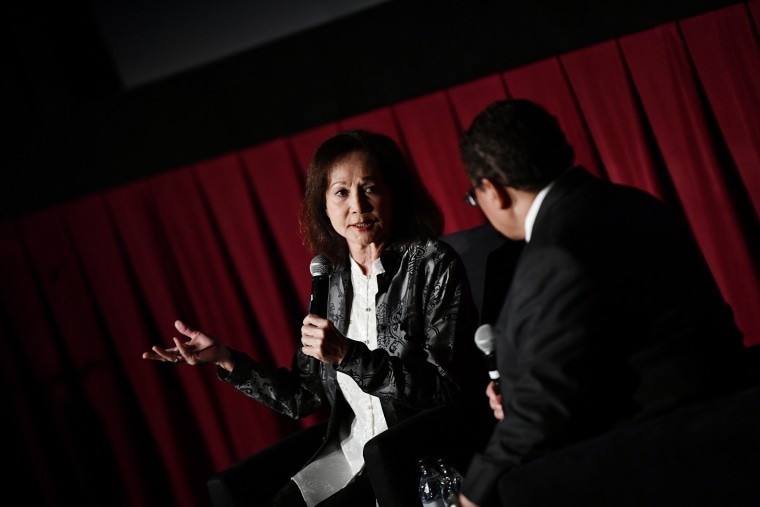To commemorate this year’s Asian Pacific American Heritage Month, NBC Asian America will be interviewing a series of community pioneers, from a Korean-American musician who found mainstream success in the ‘60s to an academic credited with helping revive the Hawaiian language and the “Chinese Bardot.”
These individuals have witnessed the history of the U.S. These are their stories and their hopes for the future.
Nancy Kwan was at the first Asian Pacific American Heritage Month.
The actress, whose breakout role in 1960’s “The World of Suzie Wong” garnered her fame, popularity, and a Golden Globe for Most Promising Newcomer — Female, has a May 1990 photo with former President George H. W. Bush hanging in her kitchen to prove it.
“We were there at the White House, a few of us Asian Americans, to celebrate Asian-American Heritage Month in May,” Kwan, who is now in her 70s, recalled. “There were some really nice people, like I.M. Pei, the architect, and Sammy Lee.”
She was there, along with Pei and Lee — the first Asian-American man to win an Olympic gold medal, to witness the signing of the Asian Pacific American Heritage Month proclamation, which extended the celebration from a week to a month.
Since then, Kwan, who was born in Hong Kong and educated in Europe, has continued acting and has worked behind the camera in writing and production. She spoke with NBC Asian America about opportunity for Asian-American actors, “Crazy Rich Asians,” and grappling with dual identity.
What was a favorite or most memorable performance of your own?
I’ve been in the business for a long time.
It’s frightening in a way, actually. TCM just had their gala film festival — they have one every year — and this year the gala was honoring Mel Brooks from “The Producers” and also Scorsese.

They showed “Suzie Wong” two nights later on Saturday, and I did a Q & A for them, which was great. There were a lot of people there; they appreciated it, they liked the Q & A. I got a standing ovation, so it was nice.
“The World of Suzie Wong” was my first film, at least, that introduced me to the business.
How has Hollywood changed for Asian Americans, for both actors and people behind the camera?
For an Asian — for anyone especially in those times when I was starting — Bill Holden [Kwan's costar in "The World of Suzie Wong"] used to tell me that, he’d say, “You can do a big film and be very successful but in order to sustain a career, you have to have roles written for you.”
Unfortunately for us in Hollywood, at that time it was very restricted. I was under contract. I think I wasn’t even asked to do television because they couldn’t cross over in those days. You do movies, you don’t do television. Not like today, which is great they have the freedom to do that.
Unfortunately for us in Hollywood, at that time it was very restricted. I was under contract. I think I wasn’t even asked to do television because they couldn’t cross over in those days.
It was difficult because there were no scripts being written, or interesting roles in order to sustain one’s career. Now more minorities are settled here, the choices are much more.
I think it’s a very good time. I’m thinking of shooting something with my iPhone. For the young filmmakers, they have so many opportunities to do that.
If we talk about Asian actors and actresses, the opportunities are opening up a lot more, especially the last few years.
Television, I think has a lot to do with it. There are very good roles, and more choices, instead of just films. I think it’s still a long way — especially men, they deserve much better roles written for them. I hope it will happen. The women are getting better, especially on television today, with the young ones being in the lead. I hope for the guys it will happen soon.
Do you have any favorite movies or shows featuring Asian-American performances lately?
I’ve seen quite a few of the TV shows. Sandra Oh, I just worked with her on a voice thing, an animation, I think two years ago in Canada. It’s called “Window Horses” so I’m watching her, and Lucy Liu. There’s quite a few of them out there, which is great.
“Crazy Rich Asians”(written by Kevin Kwan, a cousin of Nancy's) could be another one.
That should be something to look forward to.
I haven’t talked to him about it. He calls me when he’s in town. I heard they had a good screening, so that’s good. He’s a very nice person, and very talented. I wish him well.
He’s written quite a few books, and followed up with two more. I hope it happens for him. It’s great.
“Flower Drum Song” was the first film with an all-Asian cast, and there was “Better Luck Tomorrow,” but it’s been a long time since we’ve seen a major movie with so many Asian or Asian-American actors.
Much too long. I think more projects are coming up.
Actually, I just wrote a script too for an all Asian-American cast. We are trying to get it funded, which is difficult. Today you either have huge movies like all those Marvel movies, with those characters, or independent films. Luckily there’s Netflix, Amazon, and so I think a lot of the minority-led or smaller project films are being funded by those, which is a great opportunity.
It’s set in San Francisco, and it’s about Asian Americans. The theme that ties it together is “feng shui,” with placements of objects — like in a house the bed has to face a certain way, the kitchen, and all that.
That is the theme that ties all these people together. And it’s not just one type of Asian American — all sorts of people that make up Asian Americans in this country. I want to direct it too. I know the subject well—I mean, I wrote the script. So we’ll see what happens.
You were one of the first Asian faces to act in a lead role. Did you have any role models or actors who paved a path before you?
It was Anna May Wong before that. Everything’s about timing in life. For her it was too early, because there were still Caucasian actresses playing Asians. She didn’t get that opportunity.
When we did “Flower Drum Song,” which was the first all-Asian film made by a studio, Universal, and was highly successful when it came out, she was supposed to have been in the film, but unfortunately she passed away right before we started shooting. I was looking forward to working with her.
You were born in Hong Kong, and grew up there. Was there any difficulty adjusting when you moved to the United States?
I went to school in England too when I was young, so I was in Europe before I came over to the States. I’m Eurasian — my father’s Chinese and my mother’s English — so I have two cultures. I grew up speaking two languages, living in two cultures. I adapted well, perhaps because of that.
I just don’t really fit in anywhere, but I’ll just have to make it happen. I’ll just be a part of it.
In a way it’s good. You’re unique and you can look at it that way. And you share two cultures: you’re Korean and you’re American. And you can get that here, all these other Asians of different cultures. I have Japanese friends, Korean friends, all types of people. It’s very nice.
This interview has been edited for length and clarity.
Follow NBC Asian America on Facebook, Twitter, Instagram and Tumblr.

